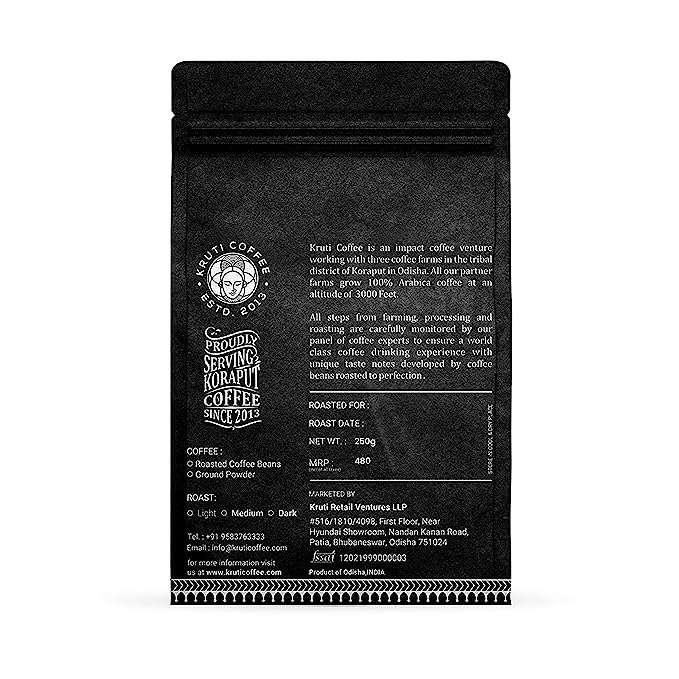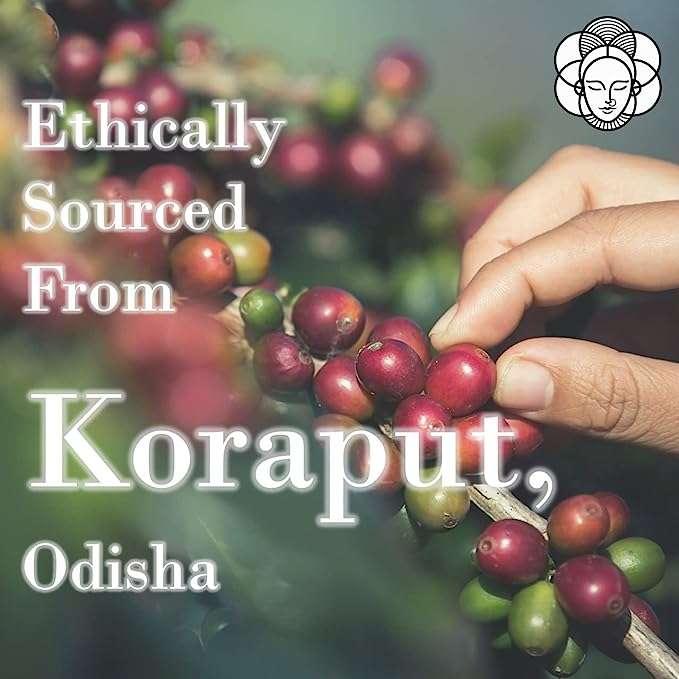Kruti Coffee – Deomali Special ( 100% Arabica Coffee Beans, Medium Roast, 250 Gm)
₹450.0
-
Product Info
100% ARABICA | SINGLE ORIGIN
PROCESS: WASHED FLAVOUR: HONEY & CARAMEL
ROAST: MEDIUM ALTITUDE: 2854-2952 FT MSL
ORIGIN: KINDIRIGUDA, KORAPUT
USP: FOREST GROWN, SHADE GROWN , TRIBAL GROWN
QUANTITY: 250 GRAMS
This specialty washed coffee from Kindiriguda, Koraput- “Deomali Special” has been roasted medium for those who like the nuanced taste notes characteristic of the coffee from Kindiriguda in Koraput. This roast profile is our tribute to the beautiful Deomali Hills in Koraput.
Please select the grind preference based on the equipment you will be using to brew your coffee. We will grind as per your preference, before shipping the coffee to you (with best compliments from us).
About Kindiriguda: A small tribal village of 40 families in Koraput, Odisha. Kruti Coffee supports Kindiriguda tribal coffee farmers across the value chain to ensure specialty standards are maintained throughout. The coffee in this packet is from the 2021-2022 batch of washed coffee from Koraput which was carefully dried on raised beds to maintain consistency.
- Description
- Additional information
- Reviews (0)
- Q & A
- Sustainability Remark
- More Offers
- Store Policies
- Inquiries
| brands | Kruti Coffee |
|---|---|
| Weight | 250 grams |
You must be logged in to post a review.
Q & A
Organic coffee is generally considered to be more sustainable compared to conventional coffee production methods. Here are some reasons why organic coffee is often viewed as a sustainable choice:
Environmental benefits: Organic coffee is grown without the use of synthetic pesticides, herbicides, and fertilizers. This reduces chemical runoff into water bodies, preserves soil fertility, and promotes biodiversity. Organic farms also typically employ practices like shade-grown cultivation, which helps conserve forest ecosystems.
Health benefits: Organic coffee is free from synthetic chemicals, which can be harmful to both farmers and consumers. By avoiding the use of pesticides and herbicides, organic farming practices prioritize the well-being of workers and consumers alike.
Soil conservation: Organic coffee farming emphasizes soil health through practices like composting, crop rotation, and the use of natural fertilizers. These methods enhance soil structure, fertility, and water retention capacity, promoting long-term sustainability and reducing the risk of soil erosion.
Water conservation: Organic coffee farms often implement water conservation measures such as efficient irrigation techniques, mulching, and organic matter addition. These practices help minimize water usage and protect water quality.
Social responsibility: Organic coffee certification standards generally prioritize fair trade, ensuring that farmers receive fair prices for their products. This contributes to sustainable livelihoods for coffee-growing communities and promotes social equity within the supply chain.
Despite these sustainability advantages, it's important to note that organic certification alone does not guarantee absolute sustainability. Other factors, such as transportation methods, packaging, and waste management, also play a role in the overall sustainability of coffee production and consumption.
It's worth mentioning that the sustainability of coffee extends beyond organic farming methods. Sustainable practices can also include initiatives like carbon offsetting, agroforestry systems, water resource management, and social welfare programs. By supporting brands that prioritize sustainability across their entire supply chains, consumers can contribute to a more sustainable coffee industry.
General Inquiries
There are no inquiries yet.




















Reviews
There are no reviews yet.